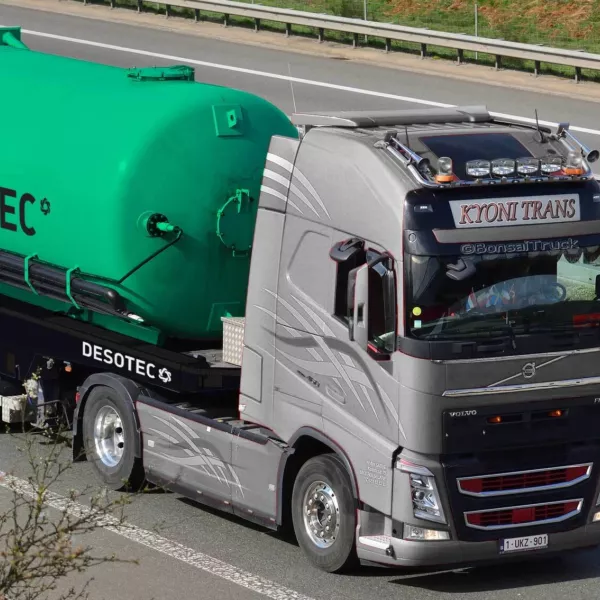Purifying rinsing water for reuse in the cosmetics industry
Manufacturers today are keen to find innovative ways to conserve natural resources and make cost savings. As this case study from a French cosmetics company illustrates, Desotec’s sustainable mobile filters can be used to purify rinsing waters for reuse in industrial processes, conserving water and saving on disposal costs.
The problem
This major company produced cosmetics at its plant in France. Between each batch, the production equipment required rinsing.
The company had a contract with a water management company to treat and discharge this rinsing water. However, it was keen to save on fresh water and discharge costs by reusing it instead.
To do so, the manufacturer needed to purify the rinsing water of cosmetic residues and the detergents used in the cleaning process, together measured as chemical oxygen demand (COD).
The water specialist advised on a system which included an activated carbon filtration step. As it had partnered with Desotec on several other projects, it recommended our solutions to the end client.

The solution
Our water management partner installed a pilot system comprising several steps: flotation, biological treatment using aerated tanks, another flotation stage, a sieve, activated carbon filtration, another sieve, then a membrane for reverse osmosis.
The role of the activated carbon filter was to protect the membranes from becoming clogged.
The pilot test revealed that this set-up was successful in handling the fluctuating flow rate and reducing the COD to less than 15 mg/ l prior to the reverse osmosis.
However, tests showed that the carbon was also raising the pH level of the water. Therefore, Desotec suggested adapting its filter before delivery to neutralise the pH. This, plus an injection system after the filter, resolved the issue.
Once the pilot test had proven successful, the end client was confident in giving the go-ahead for a full-scale installation. Desotec delivered and installed two larger Mobicon filters in 2019.
The results
The end client was happy with the set-up, which remained in place for a year.
At that point, production moved away from the site, and the water reuse project came to an end. As Desotec’s filters are mobile and supplied on a rental basis, it’s simple to remove them when they’re no longer needed. With no upfront investment, they’re ideal for temporary usage.
Desotec’s expertise and 30-plus years of experience mean we are adept at resolving issues such as the pH level encountered in this project. Our system is flexible, and we are happy to go the extra mile for clients. This is demonstrated by the long-standing partnerships we have, and the way our business grows through word-of-mouth recommendations.
A huge bonus of our business model is that we handle all filtration waste as part of our full-service solution. When filters are saturated, exchange is a swift and simple process that requires no production downtime and produces no carbon dust. We then transport closed filter units to our facilities, where we analyse samples. All adsorbed molecules are destroyed in our furnaces in a process that is continuously monitored to ensure that only harmless water vapour exits the chimney.
Wherever possible, carbon is reactivated. This circular model keeps costs down and helps companies meet their green goals.
How can we help with your water purification needs?
To discuss how our activated carbon filtration solutions could help your company to reuse water, contact our experts today.
Contact our expertsHow can we help with your water purification needs?
To discuss how our activated carbon filtration solutions could help your company to reuse water, contact our experts today.
Contact our experts-
Water & liquid purification
Our mobile filtration solutions purify wastewater and groundwater, and ensure process liquids reach high purity standards. -
Our unique service
Our closed-loop, full-service model is as unique as your business needs. We’ll define the right filtration setup and safely recycle filtration waste, making it easy to go green. -
Your sustainability journey
We care about protecting our air, water and soil for future generations, just like you. Our filtration solutions help you meet environmental standards, reducing your carbon footprint.


